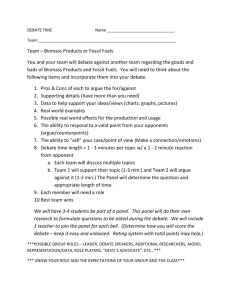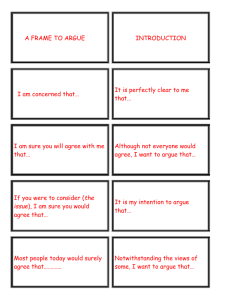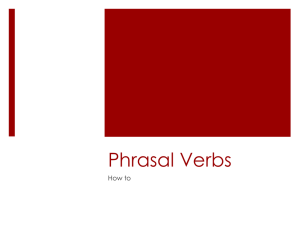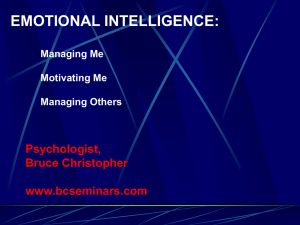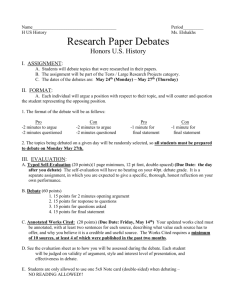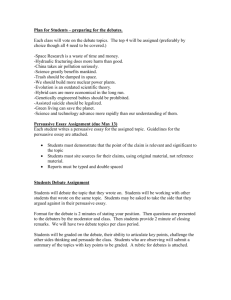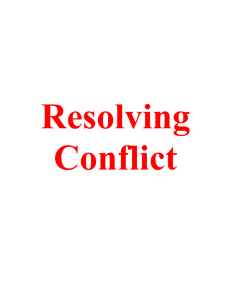I. Introduction
advertisement
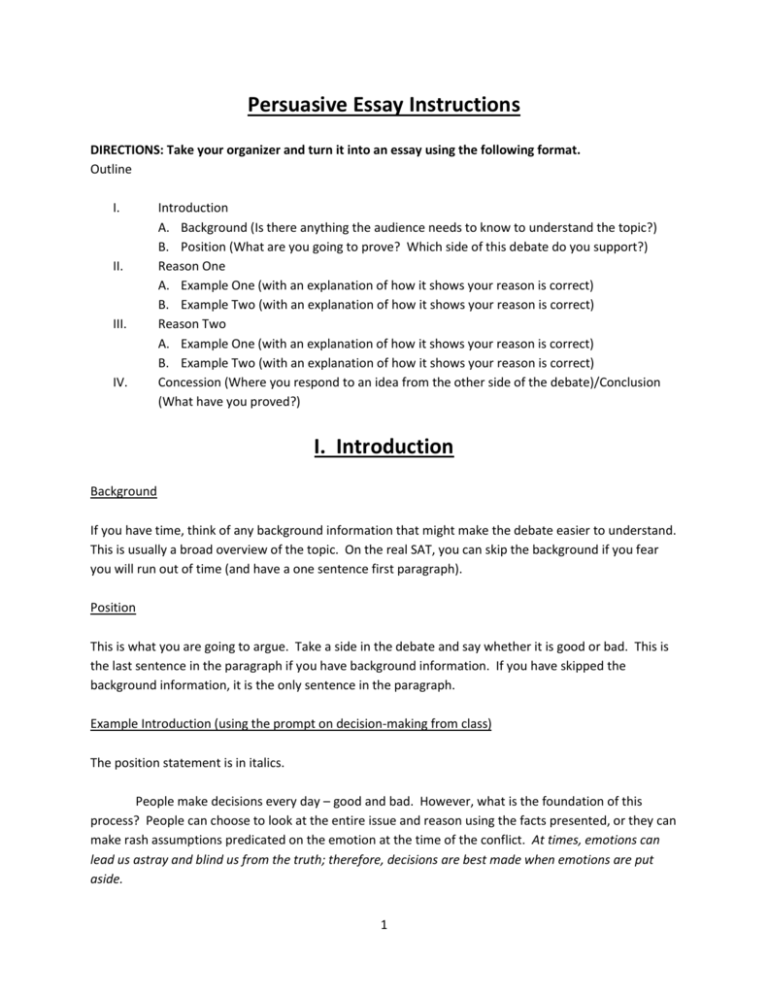
Persuasive Essay Instructions DIRECTIONS: Take your organizer and turn it into an essay using the following format. Outline I. II. III. IV. Introduction A. Background (Is there anything the audience needs to know to understand the topic?) B. Position (What are you going to prove? Which side of this debate do you support?) Reason One A. Example One (with an explanation of how it shows your reason is correct) B. Example Two (with an explanation of how it shows your reason is correct) Reason Two A. Example One (with an explanation of how it shows your reason is correct) B. Example Two (with an explanation of how it shows your reason is correct) Concession (Where you respond to an idea from the other side of the debate)/Conclusion (What have you proved?) I. Introduction Background If you have time, think of any background information that might make the debate easier to understand. This is usually a broad overview of the topic. On the real SAT, you can skip the background if you fear you will run out of time (and have a one sentence first paragraph). Position This is what you are going to argue. Take a side in the debate and say whether it is good or bad. This is the last sentence in the paragraph if you have background information. If you have skipped the background information, it is the only sentence in the paragraph. Example Introduction (using the prompt on decision-making from class) The position statement is in italics. People make decisions every day – good and bad. However, what is the foundation of this process? People can choose to look at the entire issue and reason using the facts presented, or they can make rash assumptions predicated on the emotion at the time of the conflict. At times, emotions can lead us astray and blind us from the truth; therefore, decisions are best made when emotions are put aside. 1 II. & III. Big Reasons Why Your Position is Right Take your organizer and turn the reasons into paragraphs. Each big reason should have at least two pieces of support. On the real STAAR persuasive essay(because of time constraints), you can pair this down to one example, but understand that your score will suffer with less development. If you did the organizer correctly, this should be easy. Structure (1) State your reason. This is your topic sentence. (2) State your first example. (3) Briefly discuss how this connects to your reason. (3) Transition to your second example. (4) Briefly discuss how this connects to your reason. If this seems familiar, it is exactly the same format as the cross-over OER for TAKS. Example Transition Statements to Second Example another way/example this is like similarly in a similar fashion along the same lines Example Body Paragraphs (using the decision-making prompt) in the same way likewise also in addition moreover Topic Sentence Reason # 1 Emotions, such as fear, can blind us from what is really important. In my second period English class, my teacher got angry at a student for not paying attention and kicked him Evidence/Example out of the class because he feared that the students’ failure would reflect on his teaching. The consequences that the teacher hoped would be placed on the student were actually placed on the teacher. In the state of Texas, teachers are held accountable for the learning of their students. In this instance, the teacher was scared because he knew that by not paying attention, the student would make the teacher look bad. This fear caused the teacher to Explanation ironically kicks the student out for not getting the lesson, and in the end, it will be the teacher who pays the price since he has to make sure the lesson is taught. The intended consequence was for the student; however, it was the teacher who will suffer, and it was his fear that hid this consequence from the teacher. Likewise, tragedies like Columbine can also create so much fear in a society that the people are blinded from the truth. For example, after Example Columbine, many people blamed music stars, like Marilyn Manson, for the violence they put Evidence #2 out there, and attempted to censor their creativity. Manson had to defend himself in a Rolling Stone article from people who blamed him for the Columbine shootings. The idea that one 2 musician is to blame for such a terrible act is ridiculous. Manson, in his article, makes it very clear that neither of the boys listened to his music, and also made a compelling argument that society as a whole is to blame. It is obvious that the truth is much deeper than relying on a single scapegoat to take the blame. However, because of fear, people wanted an easy answer so that they could feel like they were protecting their family. For most people, it is easier to throw out all the CD’s of one musician than it is to understand how a whole society can impact a single event. Yet fear keeps them from being honest with themselves. Explanation Topic Sentence Emotions, such as anger, can also keep people from rationally solving problems. For Reason # 2 Example, Eric Harris and Dylan Klebold were so angry about how their peers treated them that they killed 11 people at Columbine High School, where the two boys attended. The two boys’ Example/Evidence anger built up in a way that required them to deal with. The anger, however, was so great that it did not allow them to utilize their logic. Therefore, any rational solution to the problem, Explanation even a less emotional outlet, such as fighting, was taken out of the decision. Instead, the two boys followed the path that their anger created and did the unthinkable. In the end, the Example solution the boys chose created more problems than it solved. Another example of anger Evidence #2 keeping people from rationally solving problems is the assassination of Martin Luther King, which occurred as a result of hatred and anger that one black man had the audacity to stand up to a society of racism and to promote equality among all races. The man who murdered one of America’s heroes chose emotion over practical reasoning. He allowed his fear and Explanation hatred to suppress any logical approach to understanding the world and how to live peaceably. In his short life, Martin Luther King made changes in history we will live by forever. Imagine what he could have done if one man did not allow his judgment to be clouded by emotion. IV. Concession This is where you take an idea from the other side of the debate and argue against it. This makes your essay seem more balanced and fair, like you are taking the other side into consideration. WHAT YOU DO NOT WANT TO DO IS ARGUE FOR THE OTHER SIDE. YOU ARGUE AGAINST IT. On the real STAAR you can skip this if you are running out of time/space or replace it with a third reason. Example Language to Introduce The Claim From the Other Side of the Debate Some have claimed/argued One often heard claim is Some have supported by ___ by claiming Often people justify ___ by arguing 3 It is often said that One might think that Conventional wisdom has it ___ tend to believe that ___ Given ___, many will argue A number of people feel It has become common to argue V. Conclusion This should be one or two sentences at the most. Sum up what you proved and restate your position. Example Language to Introduce the Conclusion Ultimately Hence To conclude Thus Fundamentally Of course Although In brief In closing Therefore As a consequence of Example Conclusion Emotions, such as anger and fear, need to be taken out of the decision making process. If they are left alone to make decisions, then not only can it cause the death of other people, but it can cause the death of certain freedoms. 4
